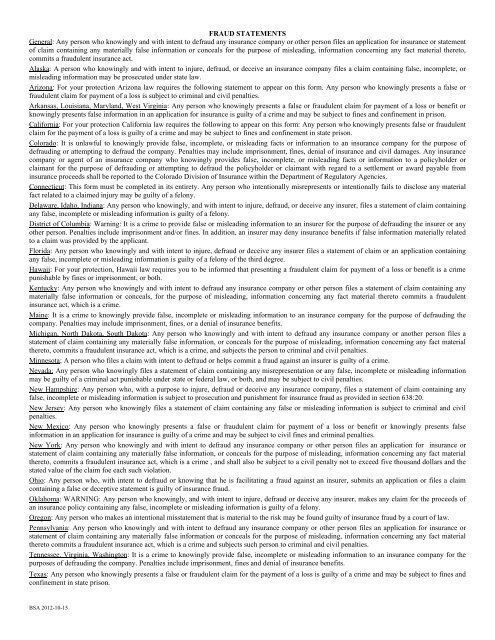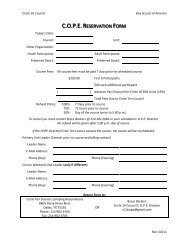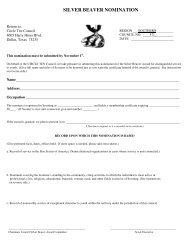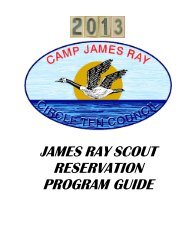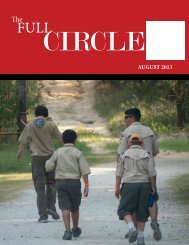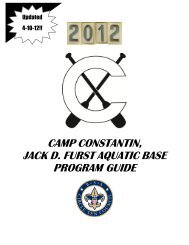Sickness & Accident Claim Form - Circle Ten Council
Sickness & Accident Claim Form - Circle Ten Council
Sickness & Accident Claim Form - Circle Ten Council
Create successful ePaper yourself
Turn your PDF publications into a flip-book with our unique Google optimized e-Paper software.
FRAUD STATEMENTS<br />
General: Any person who knowingly and with intent to defraud any insurance company or other person files an application for insurance or statement<br />
of claim containing any materially false information or conceals for the purpose of misleading, information concerning any fact material thereto,<br />
commits a fraudulent insurance act.<br />
Alaska: A person who knowingly and with intent to injure, defraud, or deceive an insurance company files a claim containing false, incomplete, or<br />
misleading information may be prosecuted under state law.<br />
Arizona: For your protection Arizona law requires the following statement to appear on this form. Any person who knowingly presents a false or<br />
fraudulent claim for payment of a loss is subject to criminal and civil penalties.<br />
Arkansas, Louisiana, Maryland, West Virginia: Any person who knowingly presents a false or fraudulent claim for payment of a loss or benefit or<br />
knowingly presents false information in an application for insurance is guilty of a crime and may be subject to fines and confinement in prison.<br />
California: For your protection California law requires the following to appear on this form: Any person who knowingly presents false or fraudulent<br />
claim for the payment of a loss is guilty of a crime and may be subject to fines and confinement in state prison.<br />
Colorado: It is unlawful to knowingly provide false, incomplete, or misleading facts or information to an insurance company for the purpose of<br />
defrauding or attempting to defraud the company. Penalties may include imprisonment, fines, denial of insurance and civil damages. Any insurance<br />
company or agent of an insurance company who knowingly provides false, incomplete, or misleading facts or information to a policyholder or<br />
claimant for the purpose of defrauding or attempting to defraud the policyholder or claimant with regard to a settlement or award payable from<br />
insurance proceeds shall be reported to the Colorado Division of Insurance within the Department of Regulatory Agencies.<br />
Connecticut: This form must be completed in its entirety. Any person who intentionally misrepresents or intentionally fails to disclose any material<br />
fact related to a claimed injury may be guilty of a felony.<br />
Delaware, Idaho, Indiana: Any person who knowingly, and with intent to injure, defraud, or deceive any insurer, files a statement of claim containing<br />
any false, incomplete or misleading information is guilty of a felony.<br />
District of Columbia: Warning: It is a crime to provide false or misleading information to an insurer for the purpose of defrauding the insurer or any<br />
other person. Penalties include imprisonment and/or fines. In addition, an insurer may deny insurance benefits if false information materially related<br />
to a claim was provided by the applicant.<br />
Florida: Any person who knowingly and with intent to injure, defraud or deceive any insurer files a statement of claim or an application containing<br />
any false, incomplete or misleading information is guilty of a felony of the third degree.<br />
Hawaii: For your protection, Hawaii law requires you to be informed that presenting a fraudulent claim for payment of a loss or benefit is a crime<br />
punishable by fines or imprisonment, or both.<br />
Kentucky: Any person who knowingly and with intent to defraud any insurance company or other person files a statement of claim containing any<br />
materially false information or conceals, for the purpose of misleading, information concerning any fact material thereto commits a fraudulent<br />
insurance act, which is a crime.<br />
Maine: It is a crime to knowingly provide false, incomplete or misleading information to an insurance company for the purpose of defrauding the<br />
company. Penalties may include imprisonment, fines, or a denial of insurance benefits.<br />
Michigan, North Dakota, South Dakota: Any person who knowingly and with intent to defraud any insurance company or another person files a<br />
statement of claim containing any materially false information, or conceals for the purpose of misleading, information concerning any fact material<br />
thereto, commits a fraudulent insurance act, which is a crime, and subjects the person to criminal and civil penalties.<br />
Minnesota; A person who files a claim with intent to defraud or helps commit a fraud against an insurer is guilty of a crime.<br />
Nevada: Any person who knowingly files a statement of claim containing any misrepresentation or any false, incomplete or misleading information<br />
may be guilty of a criminal act punishable under state or federal law, or both, and may be subject to civil penalties.<br />
New Hampshire: Any person who, with a purpose to injure, defraud or deceive any insurance company, files a statement of claim containing any<br />
false, incomplete or misleading information is subject to prosecution and punishment for insurance fraud as provided in section 638:20.<br />
New Jersey: Any person who knowingly files a statement of claim containing any false or misleading information is subject to criminal and civil<br />
penalties.<br />
New Mexico: Any person who knowingly presents a false or fraudulent claim for payment of a loss or benefit or knowingly presents false<br />
information in an application for insurance is guilty of a crime and may be subject to civil fines and criminal penalties.<br />
New York: Any person who knowingly and with intent to defraud any insurance company or other person files an application for insurance or<br />
statement of claim containing any materially false information, or conceals for the purpose of misleading, information concerning any fact material<br />
thereto, commits a fraudulent insurance act, which is a crime , and shall also be subject to a civil penalty not to exceed five thousand dollars and the<br />
stated value of the claim foe each such violation.<br />
Ohio: Any person who, with intent to defraud or knowing that he is facilitating a fraud against an insurer, submits an application or files a claim<br />
containing a false or deceptive statement is guilty of insurance fraud.<br />
Oklahoma: WARNING: Any person who knowingly, and with intent to injure, defraud or deceive any insurer, makes any claim for the proceeds of<br />
an insurance policy containing any false, incomplete or misleading information is guilty of a felony.<br />
Oregon: Any person who makes an intentional misstatement that is material to the risk may be found guilty of insurance fraud by a court of law.<br />
Pennsylvania: Any person who knowingly and with intent to defraud any insurance company or other person files an application for insurance or<br />
statement of claim containing any materially false information or conceals for the purpose of misleading, information concerning any fact material<br />
thereto commits a fraudulent insurance act, which is a crime and subjects such person to criminal and civil penalties.<br />
<strong>Ten</strong>nessee, Virginia, Washington: It is a crime to knowingly provide false, incomplete or misleading information to an insurance company for the<br />
purposes of defrauding the company. Penalties include imprisonment, fines and denial of insurance benefits.<br />
Texas: Any person who knowingly presents a false or fraudulent claim for the payment of a loss is guilty of a crime and may be subject to fines and<br />
confinement in state prison.<br />
BSA 2012-10-15


